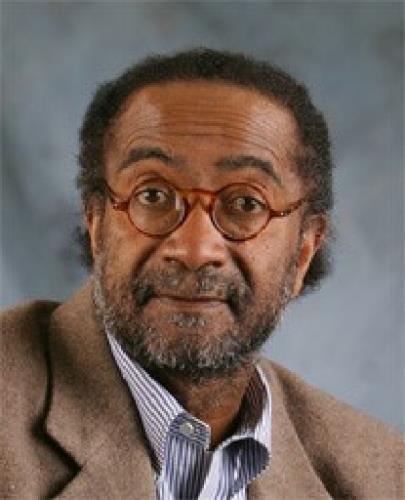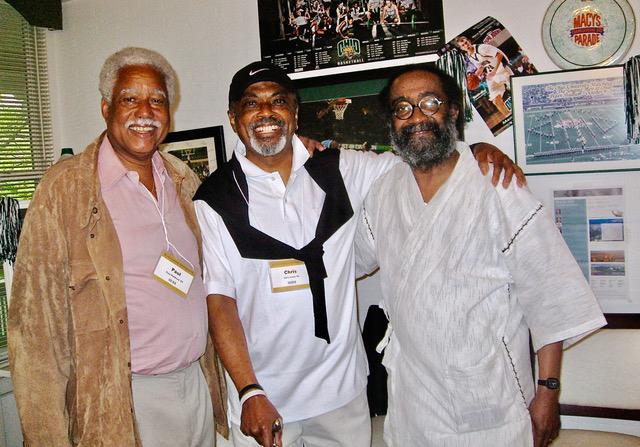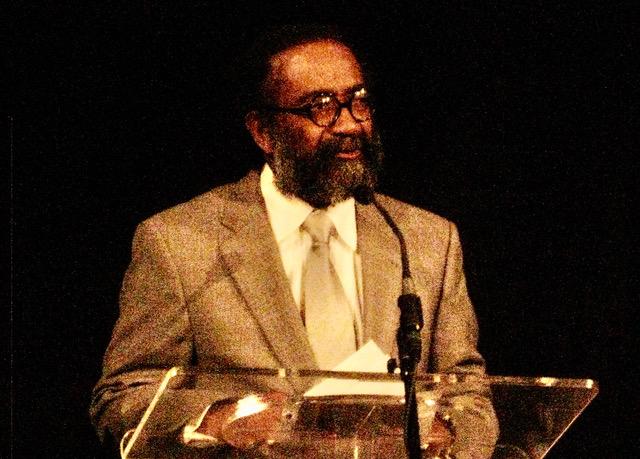
University community mourns Edwin Curmie Price Jr., alumnus and OHIO's first Black faculty member

Edwin Curmie Price Jr., an Ohio University alumnus and the University's first Black faculty member, passed away on April 23.
The history and status of Black Americans at Ohio University, published in 1974, notes "the hiring of O.U.'s first black faculty member, E. Curmie Price, in the English Department" in 1963. Price earned a Master of Arts degree in literature from OHIO in 1964. He taught first-year writing courses — then labeled ENG 100.
“He may have taught the works of Shakespeare and Milton, yet his gift was to understand Baldwin and Ellison. The birth of our friendship was in Athens the same day President Kennedy was shot in Dallas," alumnus Chris Jones '65 said. “Just learning of the fatal shooting, Curmie entered the classroom and immediately and extemporaneously delivered an explanatory oration, of which I still consider linguistic genius. For more than half a century, our relationship has grown into an enviable brotherhood … sharing interests in politics, music, travel, philosophies, theories and just about everything else conceivable. He was pragmatic yet enigmatic, enlightening yet engaging, cautious yet incalculable, and yes, temperamental yet tranquil.”

While Price was with Ohio University for only two years, his experience in Athens served as a launching point for his long career in academia and service.
"It is of those two years at Ohio University that I would speak for a moment," Price wrote in a 1965 letter to Dr. Edgar Whan, then the English Department chair. "To put it to you in its most blatant terms, I should like to thank you and the department for, without a doubt, the best years of my already lengthy life. I am all the better for having spent them in Athens.... There is great beauty and lucidity in seeing men do what they must, without fanfare or posturing — it is for this that I admire you and your department. I was one of you and still am, and that gives me great pleasure."
Price's obituary provides some of the milestones on his significant career:
He earned a Bachelor's degree in philosophy from Wilmington College, a Masters in American Literature from Ohio University (and joined its faculty), and a Masters in American Studies from Yale while in the Doctorate program. At Yale, he was a Kent Fellow and attended the University of Chicago's Divinity School as a Danforth Fellow. Curmie was among a group of scholars which established the College of Ethnic Studies at Western Washington State College in Bellingham. While Studying at Yale, he taught at the Center for Humanities at Wesleyan University. In Cleveland, he taught at Case Western Reserve University, Tric-C, Notre Dame College, Ashland University, and Cleveland State University where he was awarded a Fulbright to teach in Zambia at the University in Lusaka. In addition to his academic career, Curmie served in the VISTA program in Philadelphia and New York. He was a Head Start Director and assistant director for the local Community Action Program. He held numerous administrative positions for eleven years in County Government. While employed as the Director of several departments, he completed the program for Senior Executives in State and Local Government at Harvard's John F. Kennedy School of Government.
Price has published two volumes of poetry: The State of the Union and A Country of the Mind: Poems from Zambia. He participated in several poetry readings while he was at OHIO.
He had a love for literature. In writing a letter to the editor in the Post in 1963, responding to a piece by Martin Tyler on "ten don'ts" to his white friends, Price would draw on Black novelist James Baldwin:
The "ten don'ts" are not an effort, it cannot be done, to take the risk out of black-white encounters.... No sane man would deny the difficulties. And because there are difficulties is no reason why we should not try.
We have a long way to go and the road is a tortuous one; however, if we are allowed to speculate, talking a lead from Martin's suggestions, perhaps what we need to do is simply to acquire a willingness to risk all we know in an effort to know more. The encounter, as Mr. James Baldwin has stated, can be one of fire. But I am convinced that those who risk 'the fire next time,' in an effort not to burn now, are our more important people.
"Professor Price's own words, taken from a time before email when newspapers and letters held our discourse, should give us inspiration to continue to build on a legacy he began here in Athens nearly six decades ago," Ohio University President M. Duane Nellis said. "He inspires us to do what we must, to simply 'acquire a willingness to risk all we know in an effort to know more' in the fight against racial injustice. Baldwin's book The Fire Next Time came out in 1963 and remains a classic and passionate testimonial against injustice. And that's a calling that we all can still pursue."
Price would return to Athens as his career progressed. He was teaching at Western Washington State College when he came back in 1969 to deliver a civil rights lecture sponsored by the Cutler Program. Price described "the South as it has been affected by the civil rights movement and the influence of Martin Luther King in his lecture entitled 'A Land Most Strange.'"

Price returned to Athens again to speak at a Black Alumni Reunion in 2010.
"Deborah and I were saddened to learn that Edwin Price passed away. During our tenure as President and First Lady of Ohio University, we had an opportunity to get to know and spend time with Edwin. He was a good person! We always enjoyed our conversations with Edwin," President Emeritus Roderick J. McDavis said. "Edwin will always have a special place in the annals of Ohio University as the first African-American faculty member. He cared deeply about his students and helping them to become better people. His presence as a faculty member made it possible for other African American faculty members to be hired in later years. He will be sorely missed. May he rest in peace."
"The Ebony Bobcat Network mourns the loss of Edwin Curmie Price," Valerie Biggs-Hill BSC '78, president of the National Board Ebony Bobcat Network, said. “Mr. Price was a trailblazer as the first Black faculty member at Ohio University and remained a student of academia throughout his life, evidenced by his distinguished academic career. We further recognize his commitment to students and know that he has left an indelible mark not only on them but others that had the pleasure and privilege of knowing him.”
